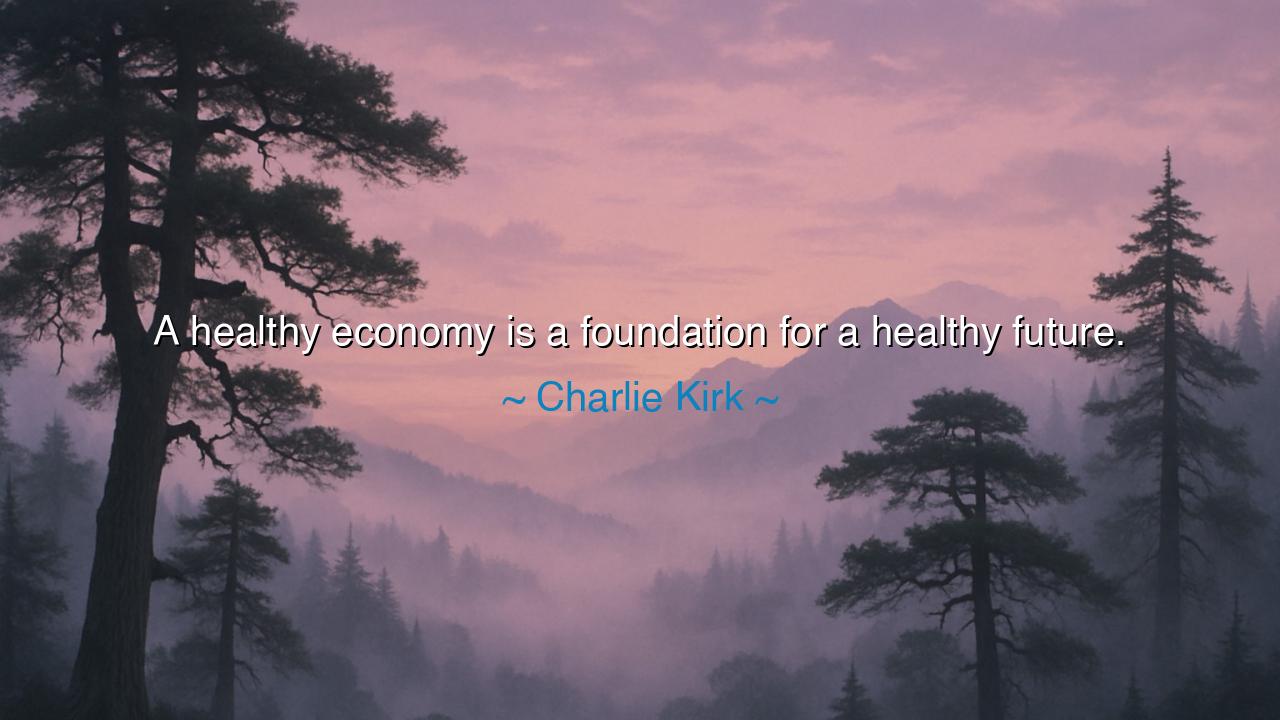
A healthy economy is a foundation for a healthy future.






In the vast chronicles of human history, one truth remains clear: the strength of a society is built upon the strength of its foundations. Charlie Kirk speaks to this truth when he states, "A healthy economy is a foundation for a healthy future." These words carry a profound resonance, for they remind us that the well-being of a people is not merely dependent on the actions of a few, but on the collective forces that shape the very structure of a society. The economy, that great web of trade, industry, and human labor, is not just a machine of numbers, but the pulse of a nation, setting the course for the lives of those who walk upon its land.
The ancient philosophers understood the power of foundations. In Plato’s Republic, he speaks of the importance of a solid and just structure upon which the state can thrive. To build a society upon weak principles, Plato warned, is to invite decay and corruption. Just as a home requires solid walls and a strong roof to protect its inhabitants, so too does a nation require a robust economic structure to ensure the security and prosperity of its people. When Kirk speaks of a healthy economy, he refers to this foundational strength—a system that not only provides for the material needs of its people but also nourishes their future.
History is replete with examples of how the economy of a nation shapes its destiny. Consider the rise of Rome—the mighty empire that spanned continents and flourished for centuries. At its core, Rome's economic system, built on trade, military conquest, and infrastructure, created an environment where art, philosophy, and innovation could thrive. The Pax Romana, a period of relative peace and economic stability, allowed the Romans to build monumental structures and create systems of law that influenced the future of civilization. Yet, the fall of Rome came not only from external invasion but from within, when the economic foundation began to crumble under the weight of corruption, debt, and mismanagement. The Romans, in their decline, lost sight of the importance of a healthy economy as the foundation for their future, and in doing so, the empire fell into ruin.
Consider also the rise of America in the 19th and 20th centuries, a nation whose economic might was a catalyst for innovation and progress. The Industrial Revolution, which began in the United Kingdom, was mirrored in America, where a new economic model based on capitalism and entrepreneurship propelled the nation to the forefront of the world stage. Henry Ford, with his mass production of automobiles, revolutionized both the economy and the way people lived. Edison and Tesla brought new technologies that reshaped industries, and the American Dream was born from an economy that allowed individuals to build, to create, and to thrive. The strength of America’s economy gave birth to new ideas, new institutions, and new opportunities for countless generations. As Charlie Kirk suggests, a strong economic foundation creates the conditions for future flourishing.
Yet, just as history shows us the power of a healthy economy, it also teaches us the dangers of neglecting that foundation. The Great Depression of the 1930s, a time of economic turmoil and widespread suffering, stands as a reminder of what can happen when the economic framework is fragile or mismanaged. During this time, millions were left without work, and countless families were plunged into poverty. But it was also during this time that the New Deal was born, an effort to rebuild and restore the economic health of the nation. This period demonstrated the vital connection between a healthy economy and the ability to navigate crises—a healthy economy is not just a luxury, but a necessity for resilience and recovery.
Thus, the lesson for us today is clear: a healthy economy is the bedrock upon which all other aspects of society rest. Without it, the future becomes uncertain, and the dreams of a people fade into the shadows. We must ensure that the economic structures we build today are not only strong but sustainable, capable of withstanding the challenges of tomorrow. As Kirk points out, a healthy economy is not just about wealth—it is about ensuring that future generations inherit a system that allows them to build, to grow, and to thrive. Whether in the realm of education, technology, or healthcare, a solid economic foundation is the key to unlocking the potential of our people.
In our own lives, we must ask ourselves: what are we doing to contribute to a healthy economy? Are we investing in education, supporting innovation, and promoting sustainability? Whether as individuals, families, or communities, we all have a role to play in building the foundation for a better future. Let us take this wisdom to heart: a healthy economy is not a distant concept but something we must actively shape through our choices, our work, and our commitment to the well-being of future generations. It is upon this foundation that the prosperity of tomorrow will be built.






AAdministratorAdministrator
Welcome, honored guests. Please leave a comment, we will respond soon